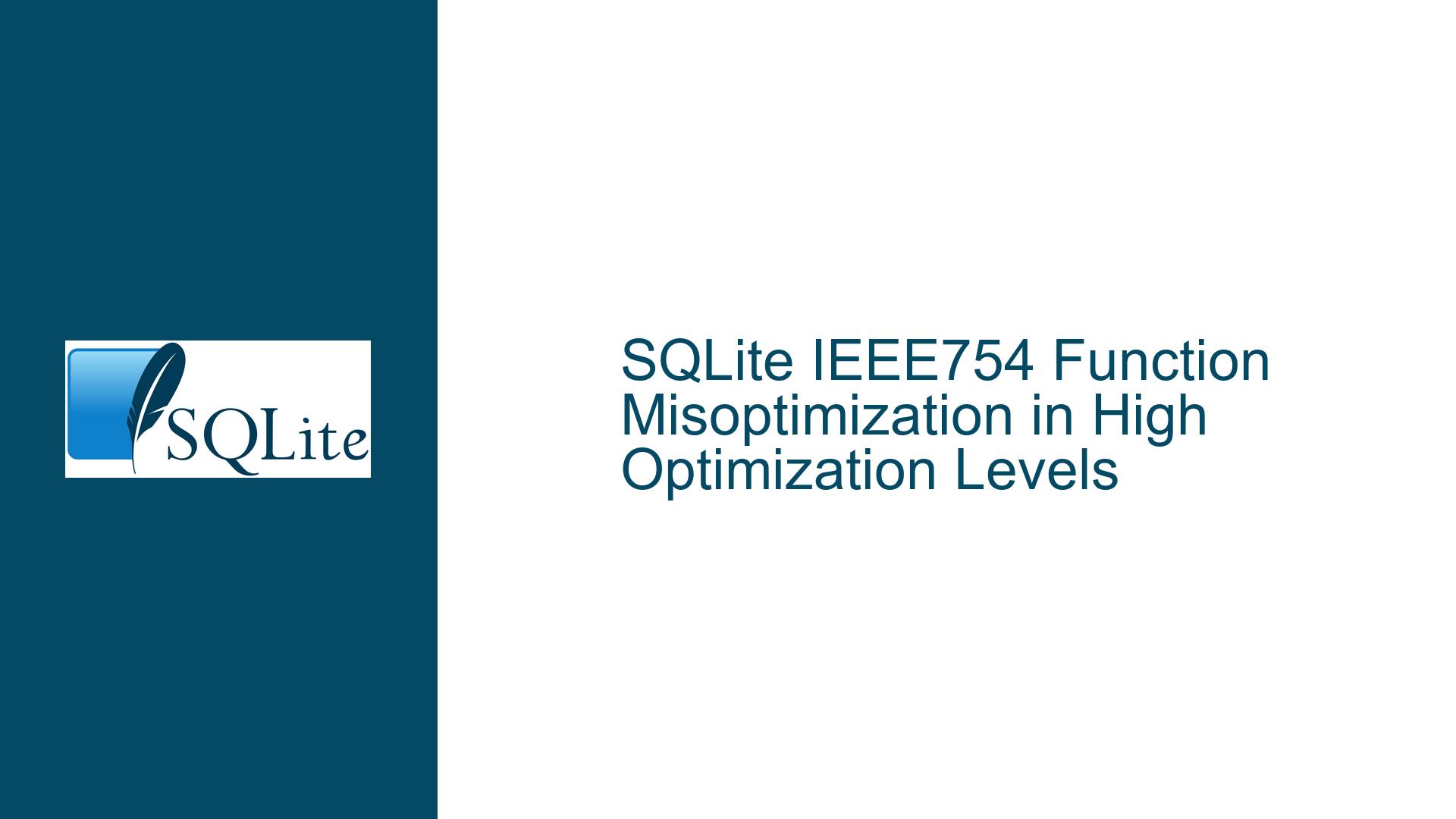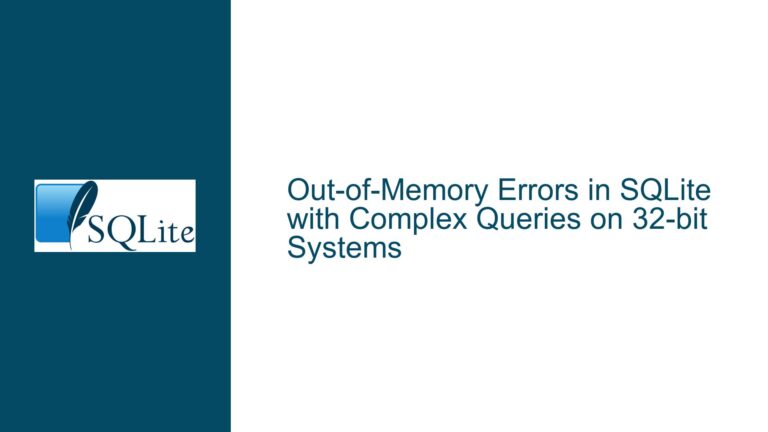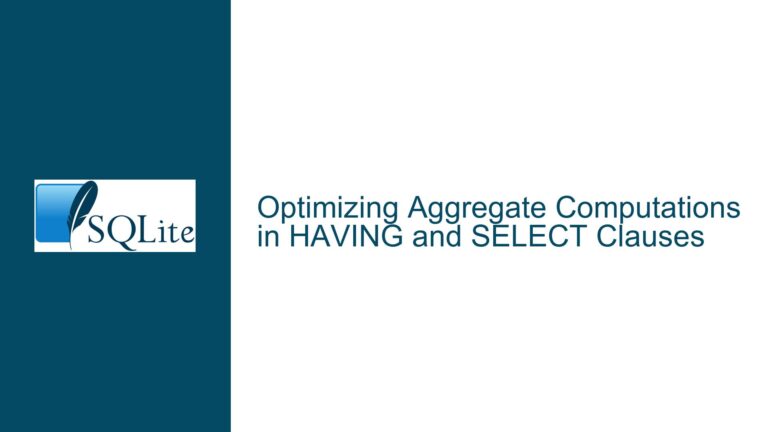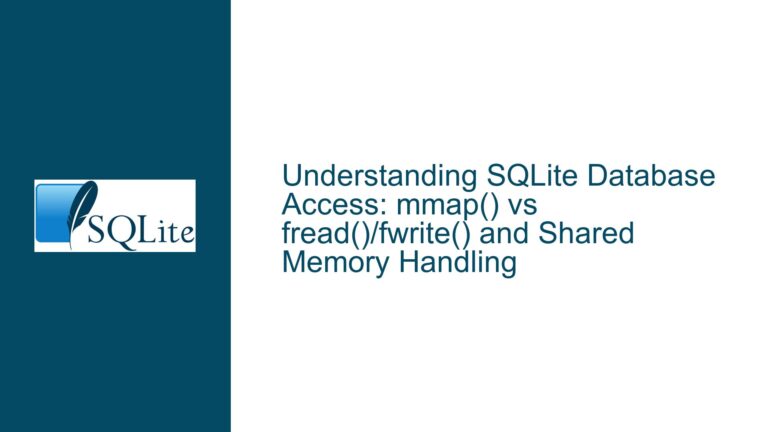SQLite IEEE754 Function Misoptimization in High Optimization Levels
Misoptimization of IEEE754 Functions in SQLite Under Compiler Optimization Levels >= 2
The issue at hand revolves around the misoptimization of the IEEE754 functions in SQLite when the code is compiled with optimization levels of 2 or higher. This misoptimization occurs in the ieee754.c file, specifically around the integer overflow at line 186. The problem has been observed with the latest versions of GCC and Clang, two of the most widely used compilers in the industry. The misoptimization leads to incorrect behavior in the IEEE754 functions, which are critical for handling floating-point arithmetic in SQLite. These functions are used to convert between floating-point numbers and their binary representations, and any misoptimization can lead to significant inaccuracies in calculations, especially in scientific and financial applications where precision is paramount.
The IEEE754 standard is a technical standard for floating-point arithmetic established by the Institute of Electrical and Electronics Engineers (IEEE). It defines the format for representing floating-point numbers, the rules for performing arithmetic operations, and the handling of special values such as infinity and NaN (Not a Number). In SQLite, the IEEE754 functions are implemented in the ieee754.c file, which provides utilities for converting between the binary representation of floating-point numbers and their decimal equivalents. These functions are used internally by SQLite to ensure that floating-point arithmetic is performed accurately and consistently across different platforms.
The misoptimization issue arises when the code is compiled with optimization levels of 2 or higher. Compiler optimization is a process where the compiler tries to improve the performance of the generated code by making it faster, smaller, or both. However, in some cases, aggressive optimization can lead to incorrect behavior, especially when dealing with low-level operations such as bit manipulation and integer overflow. In this case, the misoptimization occurs around the integer overflow at line 186 of the ieee754.c file, where the compiler incorrectly optimizes the code, leading to incorrect results in the IEEE754 functions.
The impact of this misoptimization can be severe, especially in applications that rely heavily on floating-point arithmetic. For example, in scientific computing, even a small inaccuracy in floating-point calculations can lead to significant errors in the final results. Similarly, in financial applications, incorrect floating-point arithmetic can lead to incorrect calculations of interest rates, currency conversions, and other financial metrics. Therefore, it is crucial to address this issue to ensure the accuracy and reliability of SQLite in these applications.
Integer Overflow in IEEE754 Functions Leading to Compiler Misoptimization
The root cause of the misoptimization issue lies in the integer overflow that occurs at line 186 of the ieee754.c file. Integer overflow happens when an arithmetic operation produces a result that is too large to be represented in the allocated storage space. In this case, the overflow occurs during the conversion of a floating-point number to its binary representation. The overflow is not properly handled by the compiler when optimization levels of 2 or higher are used, leading to incorrect behavior in the IEEE754 functions.
The integer overflow occurs in the following code snippet from the ieee754.c file:
i = (int)((d - (double)j) * 1000000000.0);
In this line of code, the variable d is a floating-point number, and j is an integer. The expression (d - (double)j) calculates the fractional part of d, and the result is multiplied by 1000000000.0 to convert it to an integer. However, if the fractional part of d is large enough, the result of the multiplication can exceed the maximum value that can be represented by an int, leading to an integer overflow.
When the code is compiled with optimization levels of 2 or higher, the compiler may incorrectly optimize this operation, leading to incorrect results. This is because the compiler assumes that the result of the multiplication will always fit within the range of an int, and it may optimize away the necessary checks for overflow. As a result, the generated code may produce incorrect results when an overflow occurs, leading to incorrect behavior in the IEEE754 functions.
The misoptimization issue is particularly problematic because it is not immediately obvious. The code may appear to work correctly in most cases, but it can produce incorrect results in edge cases where an overflow occurs. This makes the issue difficult to detect and debug, especially in large codebases where the IEEE754 functions are used in many different places.
To make matters worse, the misoptimization issue is not limited to a specific compiler or platform. It has been observed with the latest versions of GCC and Clang, two of the most widely used compilers in the industry. This means that the issue can affect a wide range of applications, regardless of the compiler or platform being used.
Addressing Integer Overflow and Compiler Misoptimization in IEEE754 Functions
To address the integer overflow and compiler misoptimization issue in the IEEE754 functions, several steps can be taken. The first step is to modify the code to properly handle integer overflow. This can be done by adding explicit checks for overflow before performing the multiplication. For example, the code can be modified as follows:
double fractional_part = d - (double)j;
if (fractional_part > 0.0 && fractional_part < 1.0) {
i = (int)(fractional_part * 1000000000.0);
} else {
// Handle overflow case
i = 0; // or some other appropriate value
}
In this modified code, the fractional part of d is first calculated and stored in the variable fractional_part. A check is then performed to ensure that the fractional part is within the valid range before performing the multiplication. If the fractional part is outside the valid range, the overflow case is handled appropriately.
Another approach to addressing the issue is to use a larger data type for the multiplication. For example, the long long data type can be used instead of int to ensure that the result of the multiplication can be represented without overflow. The code can be modified as follows:
long long i = (long long)((d - (double)j) * 1000000000.0);
In this modified code, the result of the multiplication is stored in a long long variable, which has a larger range than int. This ensures that the result can be represented without overflow, even if the fractional part of d is large.
In addition to modifying the code, it is also important to ensure that the compiler does not incorrectly optimize the code. This can be done by using compiler-specific attributes or pragmas to disable optimization for specific sections of code. For example, in GCC, the __attribute__((optimize("O0"))) attribute can be used to disable optimization for a specific function:
__attribute__((optimize("O0")))
int convert_fractional_part(double d, int j) {
return (int)((d - (double)j) * 1000000000.0);
}
In this example, the convert_fractional_part function is marked with the __attribute__((optimize("O0"))) attribute, which disables optimization for this function. This ensures that the compiler does not incorrectly optimize the code, even when optimization levels of 2 or higher are used.
Finally, it is important to thoroughly test the modified code to ensure that it works correctly in all cases, including edge cases where an overflow may occur. This can be done by writing unit tests that cover a wide range of input values, including values that are close to the limits of the int data type. The tests should verify that the code produces the correct results in all cases, and that it handles overflow correctly.
In conclusion, the misoptimization of the IEEE754 functions in SQLite under high optimization levels is a serious issue that can lead to incorrect behavior in floating-point arithmetic. The root cause of the issue is an integer overflow that occurs during the conversion of a floating-point number to its binary representation. To address the issue, the code should be modified to properly handle integer overflow, and compiler-specific attributes or pragmas should be used to prevent incorrect optimization. Thorough testing should also be performed to ensure that the modified code works correctly in all cases. By taking these steps, the accuracy and reliability of SQLite in applications that rely on floating-point arithmetic can be ensured.






